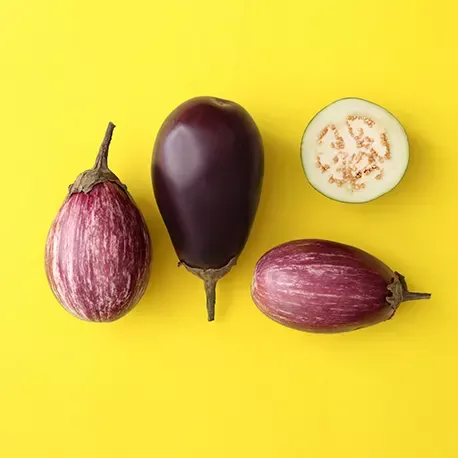Aubergine
The aubergine is also known by the name of eggplant, while in colloquial speech it is sometimes referred to as the love pear. It is considered a relative of peppers, tomatoes and potatoes. It is a heat-loving plant, grown not only in Poland but on all continents.

From the botanical perspective, the aubergine is a fruit, or more specifically, a berry. The most popular varieties resemble a large pear and have a glossy, smooth, dark purple skin. Its impressive fruit is almost 90% water, which makes it very low in calories. Aubergines are a good source of vitamin C, B group vitamins and important micronutrients such as magnesium, copper, potassium and manganese.
SPECIES
Purple aubergine
Depending on the variety, the fruits can be egg-shaped, bulbous or strongly elongated, somewhat resembling greenhouse cucumbers. The skin of all of them is shiny, but it can vary in shade - from light purple with fine stripes through darker purple to black-purple. The differences in taste are practically imperceptible.
White aubergine
Depending on the variety, the fruit can be of standard size or of a size and shape reminiscent of a hen's egg. All of them have a shiny white skin.
Exotic varieties
They take shapes ranging from spherical to thin and hooked. Colours range from dark purple to dark and light green depending on the variety. Some Asian species resemble our overripe ground cucumbers in shape and colour.
NUTRITIONAL VALUE
Nutritional value per 100g of aubergine:
ENERGY VALUE
PROTEIN
FATS
CARBOHYDRATES
VITAMIN
MAGNESIUM
Aubergine FOR YOUR HEALTH!
For good digestion
The dietary fibres, complex carbohydrates and large amounts of water contained in aubergines help enhance the function of the digestive system. These substances also support the development of a healthy intestinal microflora, which prevents constipation and stimulates immunity.
For a shapely figure
Aubergines are low in calories, which makes them ideal for anyone undertaking a reduction diet. The fibre and water contained in them mechanically stimulate the stomach, which increases the feeling of satiety. It is important not to add too much fat when preparing aubergine dishes.
For a youthful appearance
The antioxidants contained in aubergines help fight free radicals. These aggressive molecules damage cell structures, including DNA, thus accelerating ageing and degeneration. The presence of polyphenols, vitamin C and E and other antioxidants helps slow down this process.
Good for the cardiovascular system
The antioxidants in aubergines have an anti-inflammatory effect. This is important in the prevention of cardiovascular diseases. Additionally, the role of fibre is attributed to its anti-atherosclerotic properties, which are of great protective significance for the circulatory system.
PRODUCTION MAP
In Poland, aubergines are grown in the south of Mazovia, which is a region characterised by a specific microclimate that is ideal for thermophilic vegetables. This region includes the municipalities of Przytyk, Potworów, Klwów, Radzanów, Stara Błotnica, Rusinów and Wyśmierzyce.








